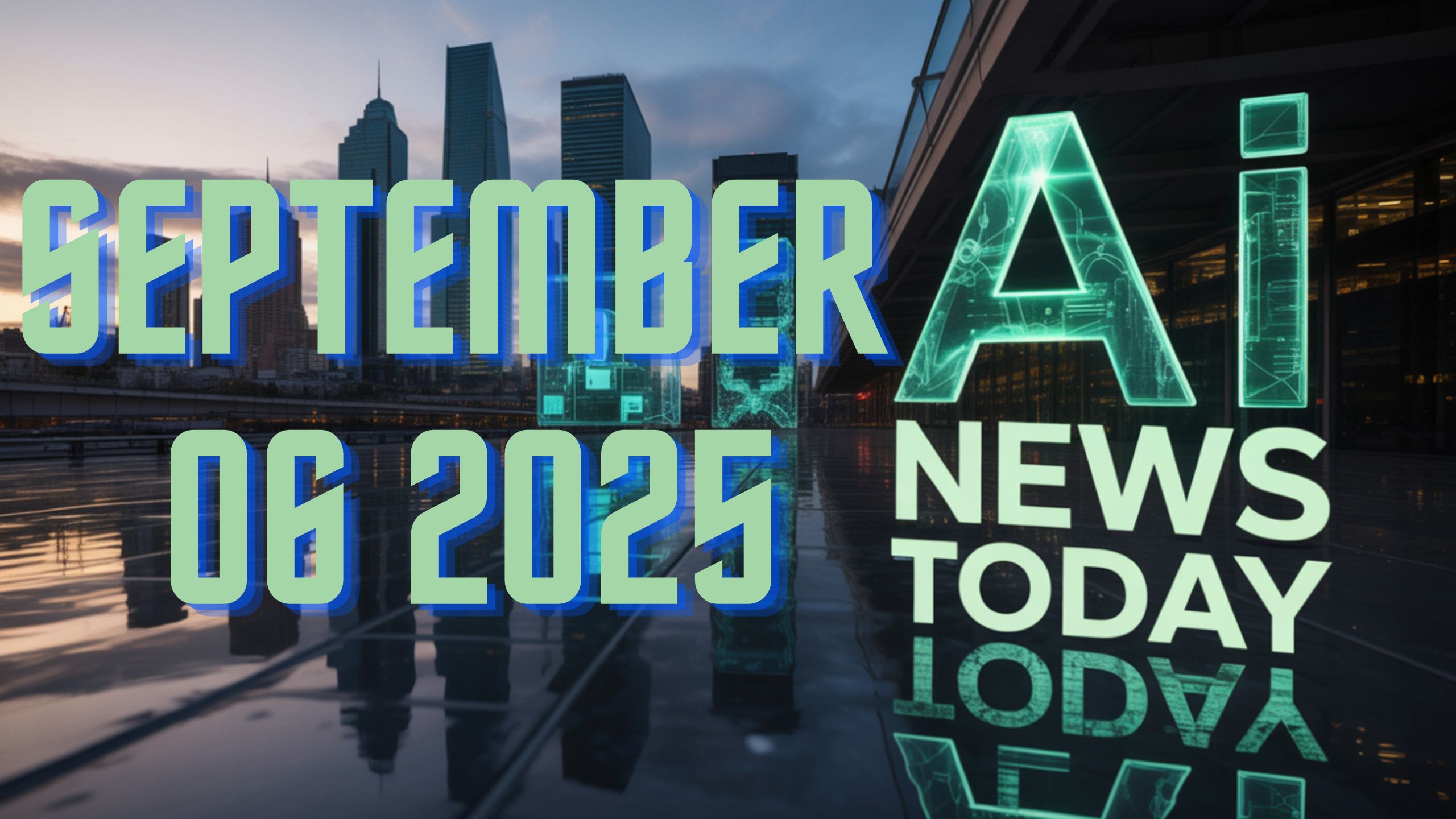AI News Daily — USA (Saturday, September 6, 2025)– Artificial intelligence remains at the forefront of global discourse, increasingly shaping not just technology but also law, policy, and society. In the United States, the AI landscape is reshaped by lawsuits, regulatory pressures, child safety concerns, and debates over chip supply chains. The latest developments illustrate how rapidly this sector evolves, with copyright settlements, litigation against tech giants, and government oversight defining the future of compliance and innovation. As policymakers push for stricter guardrails, companies face mounting pressure to balance innovation with accountability, ensuring their systems are safe, ethical, and legally sound. This moment marks a turning point, signaling that the trajectory of AI will be guided not only by technical breakthroughs but also by governance and regulation.
Anthropic’s Landmark $1.5 Billion Copyright Settlement
Anthropic has agreed to a historic copyright settlement valued at a minimum of $1.5 billion, marking one of the largest author-driven legal resolutions in the AI industry. The deal requires the company to delete pirated training files from its large language model datasets, sending shockwaves across the sector.
The case centers around 500,000 copyrighted works, implying an estimated $3,000 compensation per title. The Authors Guild, which spearheaded the legal action, frames the deal as a deterrent to unauthorized data scraping and a warning to AI developers relying on unlicensed content.
This settlement will influence future licensing norms, forcing AI model providers to negotiate fair agreements with publishers, writers, and other copyright holders. For many, this is seen as a turning point in AI data governance, ensuring stronger accountability for how models are trained.
Ripple Effects on the AI Industry
The financial burden and compliance requirements imposed on Anthropic may establish a precedent for rival AI companies, including OpenAI, Meta, and Google. Companies now face increasing pressure to audit their datasets for potential copyright violations and to pursue formal licensing agreements rather than risk billion-dollar liabilities.
Industry analysts predict that this case could reshape the economics of AI development, making content licensing partnerships a core part of training strategies. With data at the heart of machine learning models, firms must adopt clean, transparent pipelines to avoid legal exposure.
Apple Faces New Author Lawsuit Over Apple Intelligence
The legal spotlight has now extended to Apple, where authors have filed a lawsuit alleging that Apple Intelligence was trained on pirated books sourced from shadow libraries. This marks a significant escalation, as litigation moves beyond AI model labs to consumer platforms and device ecosystems.
Plaintiffs argue that Apple’s new AI system, deeply integrated across iPhones, iPads, and Macs, relies on unlicensed copyrighted works, violating intellectual property rights. If proven, this could put Apple at risk of multi-billion-dollar damages, similar to the Anthropic case.
The lawsuit signals that copyright enforcement is broadening. No longer confined to standalone AI developers, these actions now target major tech companies deploying AI at scale—a shift that could disrupt the entire digital ecosystem.
Nvidia Pushes Back Against the GAIN AI Act
Policy debates intensified this week as Nvidia criticized the proposed GAIN AI Act, calling it unnecessary, anti-competitive, and redundant. According to Nvidia, the legislation duplicates existing export-control frameworks while threatening to constrain domestic chip supply at unprecedented demand.
The criticism follows a high-profile White House CEO summit, where U.S. policymakers emphasized securing leadership in AI hardware. Nvidia argues that overregulation could backfire, reducing America’s competitiveness and slowing innovation.
This dispute underscores a broader battle over chip policy, as Washington seeks to balance national security with technological leadership. With GPUs powering nearly all major AI platforms, Nvidia’s position will significantly shape the regulatory path.
Child Safety Scrutiny Intensifies in AI Products
Child and teen safety has emerged as a priority concern for regulators. Following reports that the Federal Trade Commission (FTC) will demand internal documents from leading AI companies, new briefings confirm that letters will be sent to OpenAI, Meta, and Character.AI, requiring transparency on youth protections.
The FTC’s move reflects growing concern that AI chatbots may pose risks to mental health, online safety, and content exposure for minors. State-level probes, including those launched in Texas, are also intensifying. Together, these efforts could result in sweeping child-safety compliance standards across the AI sector.
This scrutiny raises questions about how AI platforms filter harmful content, safeguard data privacy, and design protective features. Companies must now demonstrate robust safety frameworks or risk fines, lawsuits, and reputational damage.
Geopolitics and AI Chip Access Controls
Amid escalating U.S.–China tensions, Washington is reinforcing its export restrictions on advanced AI chips. The new framework prioritizes domestic access while imposing strict limits on international sales of high-performance processors.
These rules echo the Biden-era diffusion rule, which capped AI chip exports to prevent misuse in sensitive sectors. At the same time, U.S. firms have begun restricting access to AI systems for Chinese-owned entities, raising concerns among global enterprises about supply chain uncertainty.
The strategic control of AI chips is now at the heart of international competition. By securing access for domestic players while blocking rivals, the U.S. hopes to maintain its leadership in next-generation computing power—a cornerstone of military, commercial, and research advantage.
Legal and Regulatory Momentum Continues
The combination of billion-dollar copyright settlements, high-profile lawsuits, and aggressive policy debates illustrates how the U.S. is entering a new era of AI governance. From dataset transparency to chip distribution, every corner of the industry faces intense scrutiny and accountability.
Companies must balance innovation with compliance, building powerful models and adhering to evolving legal and ethical frameworks. With lawsuits expanding, regulators tightening, and geopolitics pressuring chip access, the AI industry is navigating one of its most transformative moments.
Wrap Up: A Defining Week for AI in the United States
September 6, 2025, marks a critical juncture for the U.S. artificial intelligence industry. Anthropic’s massive settlement, Apple’s lawsuit, Nvidia’s policy clash, and child safety scrutiny illustrate how law, regulation, and technology converge.

Selva Ganesh is a Computer Science Engineer, Android Developer, and Tech Enthusiast. As the Chief Editor of this blog, he brings over 10 years of experience in Android development and professional blogging. He has completed multiple courses under the Google News Initiative, enhancing his expertise in digital journalism and content accuracy. Selva also manages Android Infotech, a globally recognized platform known for its practical, solution-focused articles that help users resolve Android-related issues.




Leave a Reply